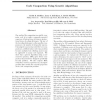Free Online Productivity Tools
i2Speak
i2Symbol
i2OCR
iTex2Img
iWeb2Print
iWeb2Shot
i2Type
iPdf2Split
iPdf2Merge
i2Bopomofo
i2Arabic
i2Style
i2Image
i2PDF
iLatex2Rtf
Sci2ools
116
click to vote
GECCO
2000
Springer
2000
Springer
Code Compaction Using Genetic Algorithms
One method for compacting executable computer code is to replace commonly repeated sequences of instructions with macro instructions from a decoding dictionary. The size of the decoding dictionary is often smallin comparison to the number of all possible macros. Choosing the macros that yield the best compaction is a di cult subset selection problem because multiple, but colliding, macros may be applicable to many code segments. We show that a genetic algorithm using a new crossover operator, MSX, gives better compaction than heuristics designed speci cally for this problem. We also compare MSX with other crossover operators on a surrogate problem that models the essential properties of the code compaction problem.
Code Compaction Problem | Crossover Operators | GECCO 2000 | Optimization | Subset Selection Problem |
Related Content
| Added | 24 Aug 2010 |
| Updated | 24 Aug 2010 |
| Type | Conference |
| Year | 2000 |
| Where | GECCO |
| Authors | Keith E. Mathias, Larry J. Eshelman, J. David Schaffer, Lex Augusteijn, Paul F. Hoogendijk, Rik van de Wiel |
Comments (0)

